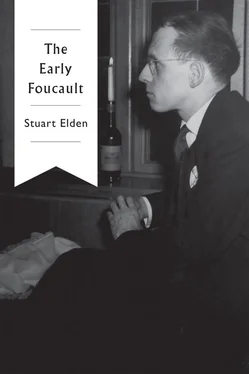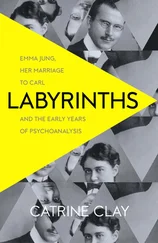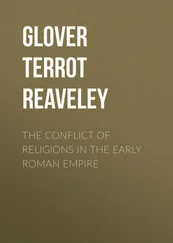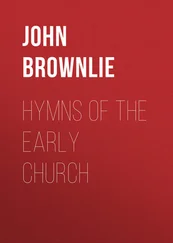Though Foucault and Canguilhem met in 1945 for the entrance to the ENS, the first significant encounter was in the early 1950s for the agrégation . 193Some traces of Foucault’s practice work are preserved in Althusser’s papers at IMEC. Althusser kept his notes on student practice presentations, with his grades written on top. Foucault scored consistently highly on these, usually between 13 and 15 out of 20, better than most other students whose marks have been preserved. For one on destiny Althusser suggested it was worth 15 or 16; for another on virtue 16 or 17. Another on science mentioned Cavaillès and Trofim Lysenko, and Althusser suggested it was worth 15. 194But Althusser also cautioned him to take care, not to be too obscure for the jury, to avoid ‘dangerous’ vocabulary, and wordplay. He suggested one text on science and philosophy would score 17–18, or 13–14, depending on whether the jury read it twice or once. The text was ‘too rich’ and some elliptical thoughts risked being seen as ‘ignorance’. 195
Foucault failed the agrégation in 1950, to general surprise. 196Candidates could be eliminated at each stage, and it was the first oral examination, on hypotheses in science, which Foucault failed, scoring just 9 out of 20. 197The sociologist Georges Davy reported that Foucault had tried to display his knowledge rather than answering the question, discussing Parmenides and not Claude Bernard. 198Among the candidates who beat him were Pierre Aubenque, Jean-Pierre Faye, Jean-François Lyotard and Jean Laplanche. 199Althusser’s students usually did well, with five each passing in 1950 and 1951, but nonetheless the failures led to rumours of a bias against communists. The agrégation was strongly criticized in the PCF journal La Nouvelle Critique in 1951, in an article signed by Jean Néry, but which some thought the editor Kanapa himself may have written. ‘Néry’ was actually Althusser’s student Michel Verret, who passed on his second attempt in 1953. 200
Foucault’s failure seems to have led to a major depressive episode, including a spell in an institution, where Althusser helped him to get better treatment and housing. 201However, he did spend three weeks in Göttingen in August 1950, at the Fridtjof Nansen Haus as part of an international study programme. 202He returned to study at the ENS, and retook the agrégation in 1951. The jury included Hyppolite, Davy, and Canguilhem again served as president. This time Foucault drew ‘sexuality’ for the first oral component, added to the list by Canguilhem. After the event, Foucault formally complained, apparently outraged by this unsuitable topic, ironically so, given his own extensive work on the theme in his later career. 203Like Verret, Foucault passed the agrégation on this second attempt, placed second in the philosophy cohort. 204
1 1. Some of Foucault’s notes and notebooks from Lycée Henri-IV are in BNF NAF28803 (8); ones from Poitiers in boxes 7 and 9–12.
2 2. Rat gave Foucault his own preparatory notebooks, which are in BNF NAF28803 (13).
3 3. C 15–16/14–15; Didier Eribon, Michel Foucault et ses contemporains, Paris: Fayard, 1994, 233. BNF NAF28803 (7), folder 2 has the certificate, dated 4 July 1949. See Programme et conditions d’admission et de l’enseignement à institut de psychologie, Paris: Vuibert, 1949.
4 4. C 14–15/13–14; Eribon, Michel Foucault, 59–62/31–3; Macey, The Lives of Michel Foucault, ch. 2; DE#281 IV, 53–54; EW III 252–53. Some of his notes are preserved in BNF NAF2830 (38). On the ENS at this time, see Edward Baring, The Young Derrida and French Philosophy, 1945–1968, Cambridge: Cambridge University Press, 2011, ch. 3.
5 5. The famous ‘letter’ was a substantial essay, published as a book and later collected in Wegmarken (GA9, 313–64); trans. Frank Capuzzi in Pathmarks, ed. William McNeill, Cambridge: Cambridge University Press, 1998, 239–76. See also the initial letter sent by Heidegger to Beaufret, 23 November 1945, in Questions III et IV, trans. Jean Beaufret et al., Paris: Gallimard, 1990, 129–30.
6 6. Jean Beaufret, Dialogue avec Heidegger, Paris: Minuit, 4 vols, 1973–85. Only the first is translated: Dialogue with Heidegger: Greek Philosophy, trans. Mark Sinclair, Bloomington: Indiana University Press, 2006.
7 7. Jean Beaufret, Le Poème de Parménide, Paris, PUF, 1955.
8 8. David Pettigrew and François Raffoul, ‘Introduction’, in French Interpretations of Heidegger: An Exceptional Reception, Albany: SUNY Press, 2008, 1–22, 6. On the links more generally, see Pierre Jacerne, ‘The Thoughtful Dialogue between Martin Heidegger and Jean Beaufret: A New Way of Doing Philosophy’, 59–72.
9 9. Jean Beaufret, Leçons de philosophie (1): Philosophie grecque, le rationalisme classique and Leçons de philosophie (2): Idéalisme allemande et philosophie contemporaine, ed. Philippe Fouillaron, Paris: Seuil, 1998.
10 10. BNF NAF28730 (38), folder 3.
11 11. Beaufret, ‘Qu’est-ce-que Sein und Zeit?’, Leçons de philosophie (2), 361–74.
12 12. Hugo Ott, Martin Heidegger: A Political Life, trans. Allan Blunden, London: HarperCollins, 1993, 8–9.
13 13. A biography can be found at http://institutdesanti.ens-lyon.fr/spip.php?rubrique2&periode=30. Foucault briefly mentions him in DE#281 IV, 53–43; EW III, 252–3. His notes from classes attended are mainly in BNF NAF28730 (38), folder 1.
14 14. Jacques Derrida, ‘Ponctuations: Le temps de la thèse’, Du droit à la philosophie, Paris: Galilée, 1990, 439–59; ‘Punctuations: The Time of a Thesis’, trans. Kathleen McLaughlin, in Eyes of the University: Right to Philosophy 2, Stanford: Stanford University Press, 2004, 113–28. See Benoît Peeters, Derrida, Paris: Flammarion, 2010, 391–2; Derrida: A Biography, trans. Andrew Brown, Cambridge: Polity, 2013, 316.
15 15. See BNF NAF28730 (38). Among other works, see Henri Gouhier, La pensée religieuse de Descartes, Paris: Vrin, 1924; Études d’histoire de la philosophie française, Hildesheim: Olms, 1976.
16 16. Henri Gouhier, Le Théâtre et l’existence, Paris: Aubier, 1952; Henri Bergson, Œuvres, ed. André Robinet, introduced by Henri Gouhier, Paris: PUF, 1963.
17 17. Derek Robbins, ‘Pierre Bourdieu, 1930–2002’, Theory, Culture and Society, 19 (3), 2002, 113–16, 113.
18 18. The critical edition is Qu’est-ce que la critique, suivie de La culture de soi, ed. Henri-Paul Fruchaud et Daniele Lorenzini, Paris: Vrin, 2015, 33–80; the English translation is of an earlier version: The Politics of Truth, Los Angeles: Semiotext(e), 2007, 41–81.
19 19. Jean Wahl, La Malheur de la conscience dans la philosophie de Hegel, Paris: PUF, 2nd edn, 1951 [1929]; Études kierkegaardiennes, Paris: F. Aubiuer, 1938.
20 20. Jean Wahl, Existence humaine et transcendence, Neuchatel: Baconnière, 1944; Human Existence and Transcendence, ed. and trans. William C. Hackett, Notre Dame: University of Notre Dame Press, 2016. See also Transcendence and the Concrete: Selected Writings, ed. Alan D. Schrift and Ian Alexander Moore, New York: Fordham University Press, 2017. The introductions to these translations are good guides to his work. See also Ethan Kleinberg, Generation Existential: Heidegger’s Philosophy in France 1927–1961, Ithaca: Cornell University Press, 2005, 84–7.
21 21. Jean Wahl, Tableau de la philosophie française, Paris: Fontaine, 1946; Les Philosophes de l’existence, Paris: Armand Colin, 1959; Philosophies of Existence: An Introduction to the Basic Thought of Kierkegaard, Heidegger, Jaspers, Marcel, Sartre, trans. F. M. Lory, London: Routledge and Kegan Paul, 1969.
22 22. These lectures are discussed in Elden, The Archaeology of Foucault.
23 23. Michael Sprinker, ‘Politics and Friendship: An Interview with Jacques Derrida’, in E. Ann Kaplan and Michael Sprinker, The Althusserian Legacy, London: Verso, 1993, 183–231, 191.
Читать дальше










